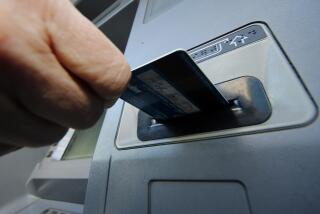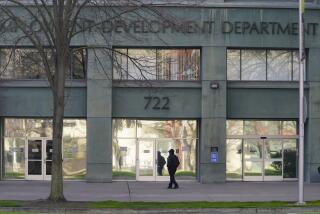California says 350,000 debit cards for unemployment benefits frozen over fraud fears
- Share via
SACRAMENTO — Faced with a deluge of fraudulent unemployment claims, California officials said Thursday that 350,000 of the debit cards they issued containing benefits have been frozen because of suspicious activity, including a high number of claims at a single address.
The debit cards frozen by the state Employment Development Department and Bank of America could represent billions of dollars in benefits paid out since the COVID-19 pandemic began in March.
“The Department’s top priority is to quickly verify the identity of any claimants in this group that may have been impacted by scammer attacks, while we work to shut down the potentially fraudulent claims,” the agency said in a statement Thursday.
The scope of the potential fraud has alarmed some state officials. But Assemblyman David Chiu (D-San Francisco) said he is also concerned that people in desperate need of unemployment benefits are also seeing their valid claims held up.
“Our offices have been hearing complaints from constituents with legitimate claims who have had their EDD debit cards frozen as a part of this fraud prevention measure,” Chiu said. “Again, EDD seems unable to address fraud without harming Californians who are depending on them for benefits.”
EDD officials said Friday that they could not provide an amount for the total benefits locked up in the frozen cards, but indicated some 4.6 million debit cards have been issued for unemployment benefits since the start of the pandemic, and $105 billion has been paid, which translates to an average of roughly $22,800 per card.
At that rate, the 350,000 frozen cards could represent more than $7.9 billion in benefits. An EDD spokeswoman said there are many variables, including when a claim is filed, that could mean frozen cards contain less than the average amount.
Law enforcement officials who have arrested more than 100 people for unemployment fraud have said the debit cards they seized potentially contained up to $20,000 in benefits each.
The EDD said it is sending notices to claimants whose debit cards have been frozen asking them to provide identity verification documents through the agency’s website.
Claimants who don’t verify their identity will be disqualified from receiving benefits.
People who have not been notified by EDD but still can’t access their funds may have had their cards frozen by Bank of America, the issuer of the cards, “because of a suspected transaction,” and they should contact the bank, the agency said. A spokeswoman for Bank of America declined comment.
The agency said its investigators “are busy working with national, state, and local partners to expose, identify, and prosecute offenders to the fullest extent of the law.”
Assemblyman Jim Patterson (R-Fresno) said one of his constituents is a homeless mother of three young girls who has spent weeks trying to verify her identity on her legitimate claim for unemployment benefits.
“The EDD still doesn’t know the difference between scammers and those in desperate need — like the 30 clients at a halfway home in my district who all had their cards shut off,” Patterson said.
Meanwhile, the EDD has also faced criticism that people calling in to three separate agency call centers have not been able to reach a service representative or get help with stalled claims.
In response, the agency said that starting Friday it is combining its three call centers into one available between 8 a.m. and 8 p.m., seven days a week.
More to Read
Sign up for Essential California
The most important California stories and recommendations in your inbox every morning.
You may occasionally receive promotional content from the Los Angeles Times.











